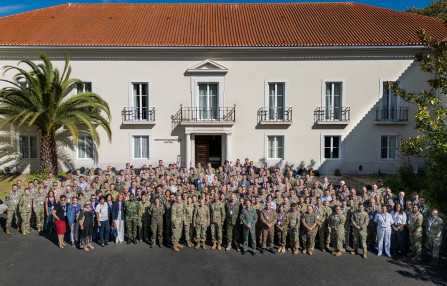Joint medical challenges, joint solutions
Text: HDF Medical Centre | 12:58 October 20, 2025The 32nd Multinational Military Medical Engagement (MMME) was recently held in Lisbon, Portugal. The primary objectives of the organization are to strengthen interoperability, promote innovation and international cooperation and develop the military medical capabilities and capacities of allied and partner countries. The prestigious international event took place at the Portuguese Military Academy, and was organized by the 68th Theater Medical Command, the Portuguese Ministry of National Defence and the Portuguese Department of Military Medical Services.

The motto of the conference “Navigating Through the Military Medical Challenges of the 21st Century” faithfully reflected the aim and spirit of the three-day event. This year’s event was the largest ever with more than 250 attendees from 23 countries taking part, among them four Hungarian military medical experts. The MMME has outstanding significance in terms of global deterrence and security as well, since it provides a platform for integrating and coordinating medical efforts. At the same time, it contributes to deepening allied relations and partnerships, strengthening the capability of taking joint action to tackle the challenges of the future.
Following the opening ceremony, Chief of Medical Service of the Portuguese Armed Forces Major General António Pedro da Costa Ferreira dos Reis gave a detailed update on the situation of Portuguese military medicine, its aims and accomplishments so far.
“The annual Multinational Military Medical Engagement bolsters international partnerships among our NATO and partner nations,” – said Dr. John Casey, global health engagements program manager for Medical Readiness Command, Europe. “It was the perfect opportunity for medical experts to exchange insights, share experiences, and address common challenges.”
Plenary sessions, panel discussions, breakout sessions and exhibitions provided a framework for joint thinking, which focused on the challenges to military medicine. The participants discussed topics such as patient/casualty medical evacuation, issues in force health protection, behavioral health practices and the emerging threats of infectious diseases in the operational environment.
The Hungarian Defence Forces and Hungarian military medicine were represented at the plenary sessions and sections of the event by HDF aviation chief physician Colonel Dr. (MD) András Sándor Szabó, Radiobiologist Eszter Persa, Psychologist Krisztián Königsberger and Emergency Physician First Lieutenant Dr. (MD) Benedek Lévai.